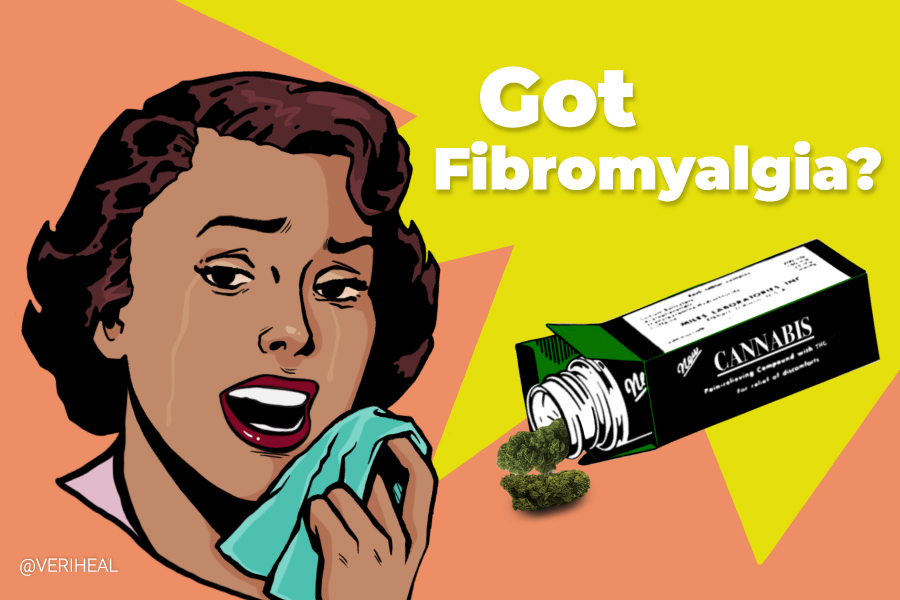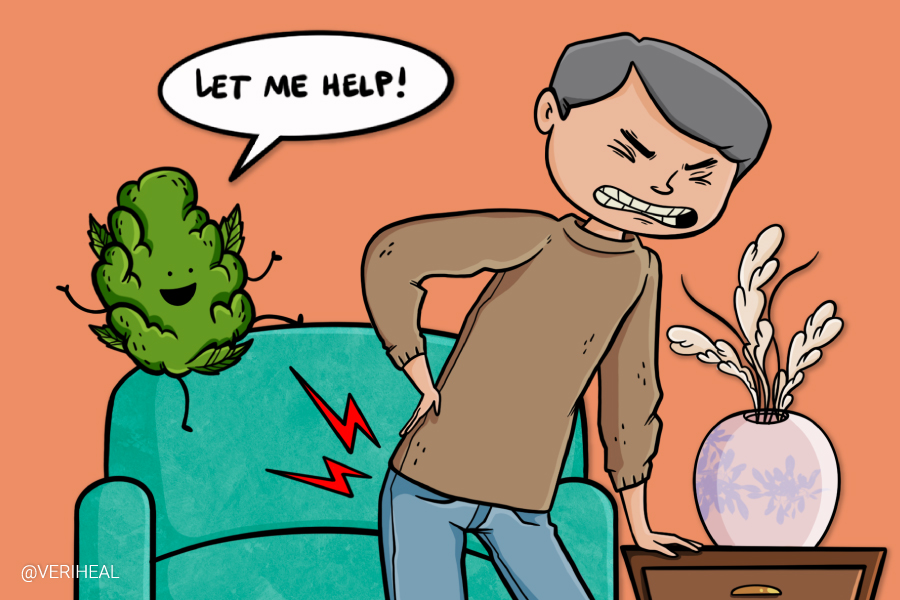Medical Marijuana for Fibromyalgia: Can It Relieve Symptoms?

Medical Cannabis and Fibromyalgia: What You Need to Know
Medical cannabis has emerged as a potential treatment option for fibromyalgia, a chronic disorder characterized by widespread musculoskeletal pain, fatigue, and cognitive difficulties. Fibromyalgia affects millions of people worldwide, and managing its symptoms can be challenging. Traditional treatment approaches often involve a combination of medications, physical therapy, and lifestyle modifications, but many patients continue to experience persistent pain and discomfort.
Cannabinoids, the active compounds in cannabis, have garnered attention for their potential therapeutic effects in alleviating fibromyalgia symptoms. Tetrahydrocannabinol (THC) and cannabidiol (CBD) are two primary cannabinoids studied for their analgesic and anti-inflammatory properties. Research suggests that medical cannabis may help reduce pain, improve sleep quality, and enhance overall well-being in fibromyalgia patients. Additionally, some individuals report experiencing fewer side effects compared to traditional medications. Despite promising anecdotal evidence and preliminary research findings, further clinical studies are needed to determine the safety, efficacy, and optimal dosing of medical cannabis for fibromyalgia. Healthcare providers should engage in informed discussions with patients, considering individual needs, medical history, and legal regulations when exploring medical cannabis as a potential treatment option for fibromyalgia.
The Science Behind Medical Cannabis for Fibromyalgia
- Fibromyalgia Causes and Complications
- Fibromyalgia Signs and Symptoms
- Fibromyalgia Treatments
- The Impact of Cannabinoids on Fibromyalgia
- Fibromyalgia Pain and Medical Cannabis Treatment
- Medical Cannabis Depression, Anxiety and Sleep Disorders
- Consult a Doctor To See if MMJ Is Right for You
Fibromyalgia (FM) is a condition that inflicts musculoskeletal pain throughout the body, along with fatigue, insomnia, and psychological and mood problems. Fibromyalgia’s abnormal pain perception processing causes extra sensitivity to pain, making sufferers feel more discomfort than others. The National Fibromyalgia & Chronic Pain Association estimates that ten million adults have this condition, which can cause migraines, facial pain, digestive disorders, and more.
There are many potential treatments for this debilitating disorder. The research journal PLOS One cited a 2011 clinical trial researching fibromyalgia patients who used cannabis and reported a better quality of life. “Further studies on the usefulness of cannabinoids in FM patients as well as cannabinoid system involvement in the pathophysiology of this condition are warranted,” according to the study (6).
Indeed, over the last 20 years, there have been 15 clinical studies looking at medical cannabis for FM symptoms (2). They are mostly observational but some are randomized trials, many using different forms of cannabis extracts and synthetics. The dosage in several studies is unclear but overall they present encouraging results.
Fibromyalgia Causes and Complications
Since the exact cause of the pain is unknown, FM is technically categorized as a “nociplastic” pain and is thought to be a disorder related to the central nervous system, and possibly a clinical deficiency of the endocannabinoid system (14). While fibromyalgia can affect adolescents, it’s commonly seen in middle-aged adults and the elderly, and it strikes lupus and rheumatoid arthritis patients even more frequently. The CDC reports several risk factors of fibromyalgia, including family history, obesity, repetitive injuries, or a traumatic event. Additionally, women are more likely to have fibromyalgia than men.
The complications connected to fibromyalgia are daunting and include increased hospitalization, lower quality of life, and higher rates of depression and suicide, according to the CDC.
Fibromyalgia Signs and Symptoms
According to the CDC, the most common symptoms of fibromyalgia are:
- Pain and stiffness all over the body
- Fatigue and tiredness
- Depression and anxiety
- Sleep disorders
- Problems with thinking, memory, and concentration
- Headaches, including migraines
Other symptoms may include:
- Tingling or numbness in hands and feet
- Pain in the face or jaw, including disorders of the jaw known as temporomandibular joint syndrome (also known as TMJ)
- Digestive problems, such as abdominal pain, bloating, constipation, and even irritable bowel syndrome (also known as IBS) (4)
Fibromyalgia Treatments
It should be noted that the overall approach to treating fibromyalgia is focused on symptom relief to maintain function and improve the quality of life of the patient. Since comorbid conditions are often present in fibromyalgia patients— it is necessary to treat co-occurring conditions such as mood disorders or sleep disorders to improve the quality of life of the patient.
Fibromyalgia’s primary manifestation is widespread pain, with cognitive behavioral therapy (CBT) and medications being the frontline treatments to offer symptom relief. Both opioids and simple analgesics such as acetaminophen have been shown to be largely ineffective (16).
According to a preprint of a 2022 systematic review, “whilst gabapentinoids and tramadol have been used by clinicians to some reported effect, although a Cochrane review of studies concludes that there is inconclusive evidence for gabapentin reducing pain in fibromyalgia (16).” This review has not yet been peer-reviewed, and therefore the manuscript may be changed before publishing. Typically, antidepressants like amitriptyline, milnacipran, and duloxetine are commonly recommended with modest benefits on pain and mood. There are several alternative methods that do not involve using pharmaceuticals to treat fibromyalgia. Other treatment methods include:
- patient education
- regular physical activity
- a balanced diet
- stress management
- cognitive behavioral therapy (4).
The Impact of Cannabinoids on Fibromyalgia
The ECS and Fibromyalgia
The endocannabinoid system (ECS) is an extensive feedback network that is present throughout the organs and the central nervous system (CNS). It is responsible for maintaining homeostasis throughout the body through the regulation of a variety of key functions such as memory, sleep, and pain perception. According to studies using animal models, anandamide—an endocannabinoid that is made naturally in the body and interacts with the body’s ECS—is the molecule responsible for the runner’s high and stress-induced pain relief (7).
Studies have shown that levels of anandamide are altered in conditions like autism spectrum disorder, fibromyalgia, complex regional pain disorders, post-traumatic stress disorder (PTSD), psychosis, and schizophrenia (5). A 2008 study that investigated the altered levels of anandamide in fibromyalgia patients concluded that, “Whether our finding of an increased activity of the endocannabinoid system as evidenced by elevated anandamide plasma levels in FM patients might represent an endogenous mechanism to limit pain and an autoprotective mechanism to cope with chronic ongoing stress has to be evaluated in further studies (9).” There is also preclinical evidence to show that FAAH inhibitors, which increase levels of endocannabinoids, could be helpful in FM and needs further study (2). In his 2016 paper on clinical endocannabinoid deficiency (CED), Dr. EB Russo suggests that “The greatest evidence for CED is present for migraine, fibromyalgia, and irritable bowel syndrome (IBS)” (14).
When cannabinoids naturally present in the Cannabis sativa plant such as cannabidiol (CBD) and delta-9 tetrahydrocannabinol (THC) interact with the ECS and activate the cannabinoid receptors, they act similarly to the body’s natural endocannabinoids such as anandamide and 2-AG causing euphoria and pain relief, inducing appetite, and reducing nausea and inflammation.
Can MMJ Provide Symptom Relief for FM Patients?
A 2020 critical review that explicitly studied the use of medical cannabis as a treatment for fibromyalgia concluded that, “MC may represent an alternative treatment for patients with FMS who are unresponsive to conventional therapy (3).”
Another study from 2019 that specifically looked at the effects of the safety and efficacy of medical cannabis for fibromyalgia concluded that, “Medical cannabis appears to be a safe and effective alternative for the treatment of fibromyalgia symptoms. Standardization of treatment compounds and regimens are required (15).” The most commonly reported adverse effects of cannabis that were reported by the participants were dizziness, dry mouth, and gastrointestinal symptoms.
The above-mentioned 2020 review of the current research echoed these results concluding that “medical cannabis is a safe and effective treatment option for patients with fibromyalgia, with reports of significant improvements in pain intensity/severity, sleep quality, level of depression, level of anxiety, and overall quality of life (3).”
The sum of available research suggests that manipulation of the ECS may help manage key symptoms of fibromyalgia such as chronic pain, sleep, quality of life, and mood, though more randomized, controlled trials with better-defined dosages are needed that specifically study fibromyalgia patients to confirm this hypothesis. As previously noted, symptom management and improving the quality of life of fibromyalgia patients is central to the treatment of FM. Let’s explore some of the most common symptoms and the current research that exists examining medical cannabis as a possible treatment with relation to fibromyalgia.
Medical Marijuana for Fibromyalgia Pain
Pain management is a crucial part of improving the health-related quality of life of patients with fibromyalgia syndrome, and medical cannabis is well known for its analgesic (pain-relieving) properties. A 2022 systematic review including the last 20 years’ worth of clinical cannabis and FM research states, “Based on the reviewed literature, inhaled cannabis has been shown to be the most beneficial in terms of pain, quality of life and sleep (2).”
A 2017 study published in the periodical Cannabis and Cannabinoid Research details that while the properties in the plant prove to regulate neuropathic pain, they can be helpful with headache disorders. One of the top symptoms of fibromyalgia is headaches. After detailing how cannabinoid receptor CB1 and tetrahydrocannabinol (THC) can regulate pain, the study confirmed the present relief it is already offering.
“In a survey of nine California clinics, physicians recorded headaches and migraines as a reason for approving a medical marijuana ID card in 2.7% of cases,” according to the study. Further research confirming medical cannabis gives relief is also reported, specifically in headache occurrence. “One retrospective study described 121 patients who received cannabis for migraine treatment, among whom 85.1% of these patients reported a reduction in migraine frequency,” according to the study (11).
The journal Pain reported in 2018 that a randomized experimental study confirmed medical cannabis alleviated symptoms in 20 chronic pain patients with fibromyalgia. Results showed, “cannabis varieties containing THC caused a significant increase in pressure pain threshold relative to placebo,” and concluded, “this experimental trial shows the complex behavior of inhaled cannabinoids in chronic pain patients with just small analgesic responses after a single inhalation (17).
A more recent open-label study which had a sample size of 70 fibromyalgia patients found that, “MC therapy significantly reduced pain intensity at 1, 3, and 12 months by at least 30% (13).”
Medical Cannabis, Depression, Anxiety and Sleep Disorders
Sleep disturbances can be a common symptom of FM patients and improving sleep quality and duration can help manage other symptoms that occur as a result of sleep disorders such as fatigue.
One small observational study published in 2020 had positive but mixed results regarding fibromyalgia patients and sleep. The study gave participants two kinds of CBD extracts and the results of this study showed that more than 30% of the patients achieved a ≥30% clinical improvement in their PSQI (sleep scores) (8).
A review of the research on cannabinoids and sleep published in 2017 stated that according to preliminary results it appears that CBD may have therapeutic potential for the treatment of insomnia (1).
Due to the higher rates of suicide and depression among patients with fibromyalgia, managing mood and anxiety disorders is an integral part of treatment. Antidepressants can be prescribed to help manage this symptom but may be ineffective for some and occasionally come with adverse side effects. The same observational study that recorded a mild improvement in sleep scores among participants also found that 50% of participants showed a moderate improvement in the anxiety and depression scales (10).
A 2021 study exploring the antidepressant and anxiolytic effects of medical cannabis found that “Medicinal cannabis use may reduce anxiety and depressive symptoms in clinically anxious and depressed populations. Future placebo-controlled studies are necessary to replicate these findings and to determine the route of administration, dose, and product formulation characteristics to optimize clinical outcomes (12).”
Consult a Doctor to See if MMJ is Right For You
Although the research on medical cannabis and sleep disorders is still in its infancy, there are now several studies that show promising results that could offer hope to fibromyalgia patients struggling to find symptom relief and improve their quality of life.
As more studies, research, and trials confirm medical cannabis alleviates chronic pain, specifically with hyperalgesia and headaches, but undoubtedly with other major symptoms such as mood and sleep disorders, these conditions will continue to qualify patients for medical marijuana cards as noted and lend hope to those who are just diagnosed.
If you are interested in additional information about medical marijuana and incorporating it into your treatment plan, consult with your doctor to see if getting a medical cannabis card could be the right choice for you.
Note: The content on this page is for informational purposes only and is not intended to be professional medical advice. Do not attempt to self-diagnose or prescribe treatment based on the information provided. Always consult a physician before making any decision on the treatment of a medical condition.
1. Babson, K. A., Sottile, J., & Morabito, D. (2017). Cannabis, cannabinoids, and sleep: A review of the literature. Current Psychiatry Reports, 19(4). https://pubmed.ncbi.nlm.nih.gov/28349316/
2. Bourke, S. L., Schlag, A. K., O’Sullivan, S. E., Nutt, D. J., & Finn, D. P. (2022). Cannabinoids and the endocannabinoid system in fibromyalgia: A review of preclinical and clinical research. Pharmacology & Therapeutics, 240, 108216. https://www.sciencedirect.com/science/article/pii/S0163725822001103?via%3Dihub
3. Cameron, E. C., & Hemingway, S. L. (2020). Cannabinoids for fibromyalgia pain: A critical review of recent studies (2015–2019). Journal of Cannabis Research, 2(1). https://jcannabisresearch.biomedcentral.com/articles/10.1186/s42238-020-00024-2
4. Centers for Disease Control and Prevention. (2020, January 6). Fibromyalgia. Centers for Disease Control and Prevention. Retrieved July 27, 2022, from https://www.cdc.gov/arthritis/basics/fibromyalgia.htm
5. Di Marzo, V. (2020). The endocannabinoidome as a substrate for noneuphoric phytocannabinoid action and gut microbiome dysfunction in neuropsychiatric disorders. Dialogues in Clinical Neuroscience, 22(3), 259–269. https://pubmed.ncbi.nlm.nih.gov/33162769/
6. Fiz, J., Durán, M., Capellà, D., Carbonell, J., & Farré, M. (2011). Cannabis use in patients with fibromyalgia: Effect on symptoms relief and health-related quality of life. PLoS ONE, 6(4).https://www.ncbi.nlm.nih.gov/pmc/articles/PMC3080871/
7. Fuss, J., Steinle, J., Bindila, L., Auer, M. K., Kirchherr, H., Lutz, B., & Gass, P. (2015). A runner’s high depends on cannabinoid receptors in mice. Proceedings of the National Academy of Sciences, 112(42), 13105–13108. https://www.pnas.org/doi/abs/10.1073/pnas.1514996112
8. Giorgi, V., Bongiovanni, S., Atzeni, F., Marotto, D., Salaffi, F., & Sarzi-Puttini, P. (2020). Adding medical cannabis to standard analgesic treatment for fibromyalgia: a prospective observational study. Clinical and experimental rheumatology, 38 Suppl 123(1), 53–59. https://pubmed.ncbi.nlm.nih.gov/32116208/
9. Kaufmann, I., Schelling, G., Eisner, C., Richter, H. P., Krauseneck, T., Vogeser, M., Hauer, D., Campolongo, P., Chouker, A., Beyer, A., & Thiel, M. (2008). Anandamide and neutrophil function in patients with fibromyalgia. Psychoneuroendocrinology, 33(5), 676–685.https://pubmed.ncbi.nlm.nih.gov/18395993/
10. Khurshid, H., Qureshi, I. A., Jahan, N., Went, T. R., Sultan, W., Sapkota, A., & Alfonso, M. (2021). A systematic review of fibromyalgia and recent advancements in treatment: Is medicinal cannabis a new hope? Cureus. https://pubmed.ncbi.nlm.nih.gov/34567876/
11. Lochte, B. C., Beletsky, A., Samuel, N. K., & Grant, I. (2017). The use of cannabis for headache disorders. Cannabis and Cannabinoid Research, 2(1), 61–71. https://www.ncbi.nlm.nih.gov/pmc/articles/PMC5436334/
12. Martin, E. L., Strickland, J. C., Schlienz, N. J., Munson, J., Jackson, H., Bonn-Miller, M. O., & Vandrey, R. (2021). Antidepressant and anxiolytic effects of medicinal cannabis use in an observational trial. Frontiers in Psychiatry, 12. https://doi.org/10.3389/fpsyt.2021.729800
13. Mazza, M. (2021). Medical cannabis for the treatment of fibromyalgia syndrome: A retrospective, open-label Case series. Journal of Cannabis Research, 3(1). https://jcannabisresearch.biomedcentral.com/articles/10.1186/s42238-021-00060-6
14. Russo, E. B. (2016). Clinical endocannabinoid deficiency reconsidered: Current research supports the theory in migraine, fibromyalgia, irritable bowel, and other treatment-resistant syndromes. Cannabis and Cannabinoid Research, 1(1), 154–165. https://www.liebertpub.com/doi/10.1089/can.2016.0009
15. Sagy, I., Bar-Lev Schleider, L., Abu-Shakra, M., & Novack, V. (2019). Safety and efficacy of medical cannabis in fibromyalgia. Journal of Clinical Medicine, 8(6), 807. https://pubmed.ncbi.nlm.nih.gov/31195754/
16. Scicluna, J. C., & Di Giovanni, G. (2022). Cannabinoids for fibromyalgia: An updated systematic review. https://www.medrxiv.org/content/10.1101/2022.05.17.22275200v1
17. van de Donk, T., Niesters, M., Kowal, M. A., Olofsen, E., Dahan, A., & van Velzen, M. (2018). An experimental randomized study on the analgesic effects of pharmaceutical-grade cannabis in chronic pain patients with fibromyalgia. Pain, 160(4), 860–869. https://www.researchgate.net/publication/329902313_An_experimental_randomized_study_on_the_analgesic_effects_of_pharmaceutical-grade_cannabis_in_chronic_pain_patients_with_fibromyalgia








